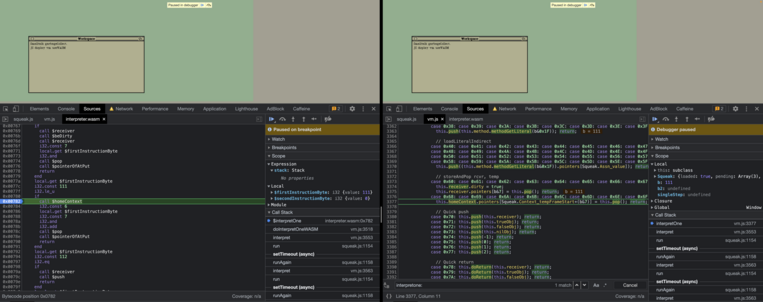#SqueakJS—#Squeak and #Cuis full-fledged #Smalltalk can now run in any #browser.💕
#CUIs
Smalltalk (Cuis)
Yes I have install #cuis on my system works great because smalltalk is its own VM. I like #smalltalk and #cuis is a great way to learn.
@alvarmaciel would you know how to modify the clock in #Squeak or #Cuis #Smalltalk to not show seconds?
I love class definitions using the module system #Haver provides.
Enter the definition shown in the first picture, with proper settings your class will be bound in a module, as shown in the second picture.
Alas #Cuis has a bug in it's ZIP file package. This code snippet does not terminate:
(z1 := ZipArchive new) zipFileComment: 'ZIP test'.
z1
addFile: SourceFiles first fileEntry as: 'f1';
writeToFileNamed: 'test.zip';
close.
See:
https://lists.cuis.st/mailman/archives/cuis-dev/2023-November/008157.html
@vidak Communication wise: nothing ;)
Concerning #Smalltalk I created an extension of #Cuis called #Haver .
Documentation and release builds are outdated, but that can be changed.
Take a look at: http://haver.klix.ch
@vidak Cool! I thought about using #HaverSmalltalk (eat your own dogfood) or #CuisSmalltalk. After all #Cuis has builtin vector-graphics with a #TrueType engine implemented in Smalltalk,
I just added experimental support for converting ASCII-art character pictures to Unicode code points to #Haver.
Every input starting with "\." and followed by a recognized picture is replaced by a corresponding Unicode code point (or, more exactly, its glyph).
#Haver now has persistent work spaces which persist the source code and the bound variables.
@drgeo Pointed to an 13 year old interview with @juanvuletich
saying:
«It is a must to read, and we can say that the heading to the Cuis' objectives have been maintained in most part.
For me the most dominant aspect of Cuis is that it is an enabler.»
It totally agree!
#Cuis #CuisSmalltalk #Smalltalk
See:
https://www.clubsmalltalk.org/2010/07/juan-vuletich-working-for-simplier-and.html
@Conornash That's interesting!
I did a complete round trip:
Started with Smalltalk/V for MDOS in the late 80s. Used the same #Smalltalk on Windows and OS/2 in the early 90s. Used C++ for the rest of that decade. Then switched to #Python as a substitute for Smalltalk. Used #Squeak and #Pharo for private projects. Finally came back to #Cuis around 2015. After some discussion I started my own Cuis-based Smalltalk called #Haver.
@Conornash That is why I gave up using #Pharo.
There are oodles of packages looking useful. Once you want to use one them, you soon discover that exactly this package stopped being useful, because it does not work or even load with newer Pharo versions. (Backward compatibility is for wimps!)
#Cuis is IMHO a much better alternative!
Debugging #webassembly and #javascript versions of #squeakjs side by side, to see where they diverge. #smalltalk #squeak #cuis #pharo #visualworks #caffeine
Using #javascript and #webassembly to their strengths in the #squeakjs virtual machine :: https://thiscontext.com/2023/05/08/catalyst-a-webassembly-enabled-version-of-squeakjs/ :: #caffeine #smalltalk #squeak #pharo #cuis #visualworks
